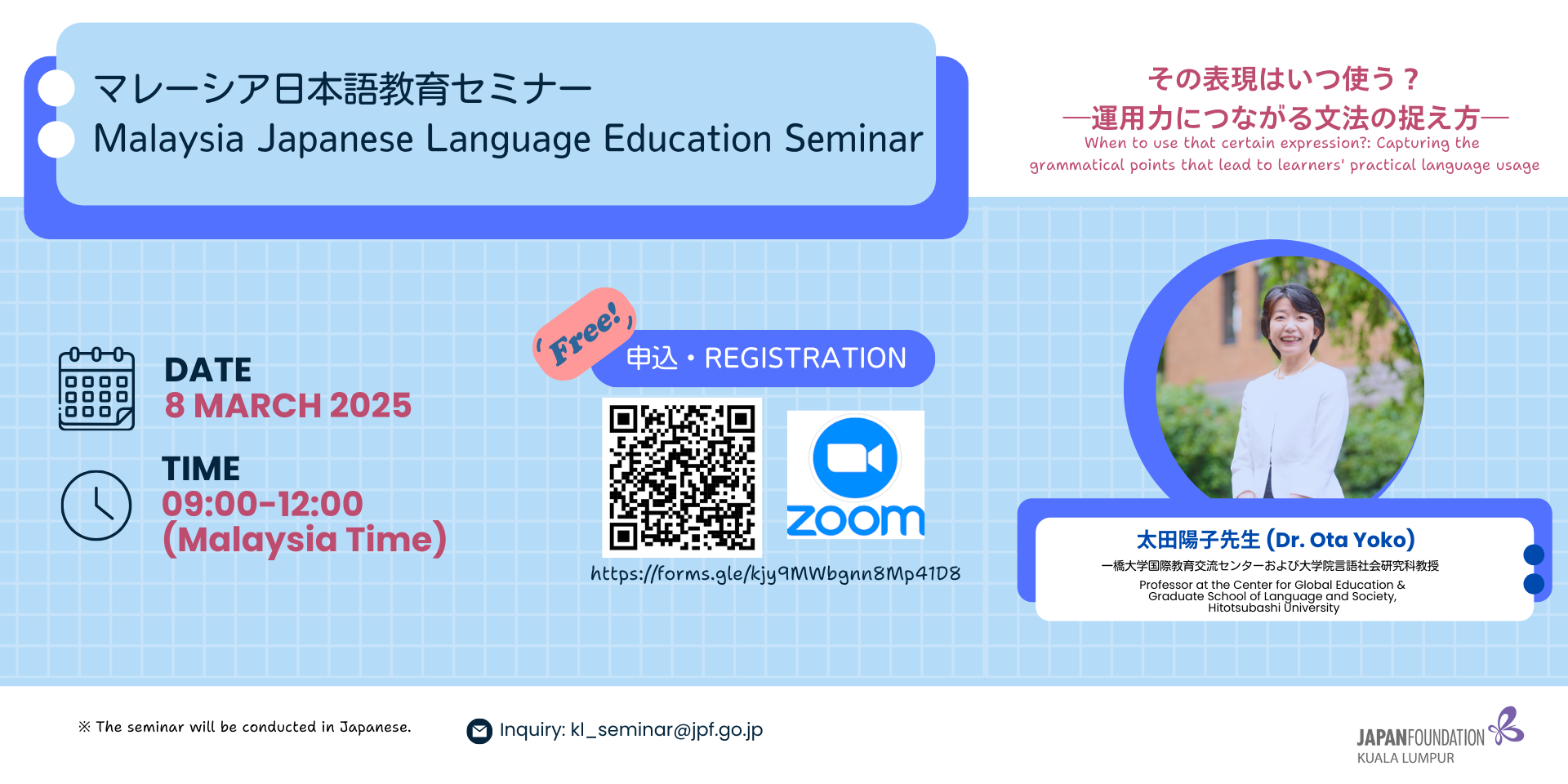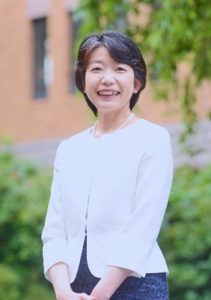For Teachers
Seminar
マレーシア日本語教育セミナー
MALAYSIA JAPANESE LANGUAGE EDUCATION SEMINAR (MJLES)

マレーシア日本語教育セミナー
MALAYSIA JAPANESE LANGUAGE EDUCATION SEMINAR (MJLES)
要旨:
ことばの教育は、これまでの言語知識中心の教育から、Can-do(できること)に基づいた行動中心アプローチによる教育へと変わってきています。しかし、それは「文法」知識が不要になったということではありません。とはいえ、これまで通りの「文法」の考え方のままでよいわけでもありません。
今回のセミナーでは、こうした背景をふまえつつ、理論的な話ではなく、普段の授業の視点から、どうすれば文法知識をさまざまな「できること」につなげられるのか、みなさんと一緒に考えます。たとえば、授受表現の「~てくれる」を教えながら、なぜ「~てもらう」だけじゃダメなのかなあと思ったことはありませんか?当日は、コーパスやシナリオなども活用しながら、この表現を知ることによる「できること」の広がりを確認します。そして、実践的な教室活動を計画するために教師が知っておくとよい視点をいくつか提案したいと考えています。
講師:太田陽子先生(一橋大学国際教育交流センターおよび大学院言語社会研究科教授)
 |
一橋大学国際教育交流センターおよび大学院言語社会研究科教授。早稲田大学大学院日本語教育研究科博士後期課程修了。博士(日本語教育学)。国際交流基金日本語教育派遣専門家としてマレーシアで3年4か月日本語教育に携わったのち、早稲田大学、相模女子大学等を経て現職。専門は教育文法・教員養成。現在は、さまざまな国から来日する留学生に対する日本語教育とともに、大学院で日本語教育の教員・研究者養成に従事している。 |
| 日時 | 2025年3月8日(土) 09:00-12:00(マレーシア時間) |
| プラットホーム | オンライン(Zoom) |
| 参加費 | 無料 |
| 対象者 | 東南アジアの日本語教師および日本語教育関係者
※本セミナーは日本語で行われます JLPT N3相当/以上の方に推奨 |
| 申込書 | https://forms.gle/kjy9MWbgnn8Mp41D8 締め切り:2025年3月6日(木) |
| フライヤー | こちら |
When to use that certain expression?:
Capturing the grammatical points that lead to learners’ practical language usage
Abstract:
Language education has been shifting from a focus on linguistic knowledge to a more action-oriented approach based on “Can-do” (what a learner can do using the language). However, this does not imply that grammatical knowledge has become unnecessary. At the same time, it does not mean that we should simply adhere to the conventional way of thinking about “grammar.”
In this seminar, rather than engaging in theoretical discussions, we will consider how to connect grammatical knowledge to various “Can-do” abilities from the perspective of everyday classroom teaching. For example, while teaching the giving/receiving expression “-te kureru”, have you ever wondered why it is insufficient to teach only “-te morau” instead? During the seminar, by examining corpus data, scenarios, etc., we will explore ways to expand “what a learner can do” through a deeper understanding of such expressions. Additionally, we will propose several perspectives that teachers may find useful for planning practical classroom activities.
The Speaker: Dr. Ota Yoko (Professor at the Center for Global Education & Graduate School of Language and Society, Hitotsubashi University)
 |
Dr. Ota is a professor at the Center for Global Education and Graduate School of Language and Society at Hitotsubashi University. She completed her doctoral program in the Graduate School of Japanese Applied Linguistics at Waseda University, earning a PhD in Japanese Language Education. After working as a Japan Foundation Japanese Language Education Specialist in Malaysia for 3 years and 4 months, she has held positions at Waseda University, Sagami Women’s University, among others, before her current position. Her expertise includes educational grammar and teacher training. Currently, she is involved in teaching Japanese language to international students from various countries in Japan, and training educators and researchers in Japanese language education at the graduate level. |
| Date & Time | 8 March 2025 (Sat) 09:00-12:00 (Malaysia Time) |
| Platform | Online (Zoom) |
| Participation Fee | FREE |
| Target Participant | Japanese language teachers & those involved in the field of Japanese Language Education in South-East Asian Countries ※This seminar will be conducted in Japanese (Recommended for those with JLPT N3 and above) |
| Registration Form | https://forms.gle/kjy9MWbgnn8Mp41D8 Deadline: 6 March 2025 (Thu) |
| Flyer | Click Here |
PREVIOUS YEARS’ SEMINAR DETAILS
- (CLOSED) 2023年度マレーシア日本語教育セミナー
- (CLOSED) 2022年度マレーシア日本語教育セミナー
- (CLOSED) 2021年度マレーシア日本語教育セミナー≪2022年3月≫
- (CLOSED) 第18回マレーシア日本語教育国際研究発表会 ≪2021年10月≫
- (CLOSED) マレーシア日本語教育セミナー ≪2021年3月≫
- (CLOSED)第17回マレーシア日本語教育国際研究発表会 ≪2020年10月≫
- (CLOSED) マレーシア日本語教育セミナー ≪2020年3月≫
- (CLOSED) 第16回マレーシア日本語教育国際研究発表会 ≪2019年10月≫
- (CLOSED) マレーシア日本語教育セミナー ≪2019年3月≫
- (CLOSED) 第15回マレーシア日本語教育国際研究発表会 ≪2018年10月≫
- (CLOSED) マレーシア日本語教育セミナー ≪2018年3月≫
- (CLOSED)『まるごと 日本のことばと文化 入門A1 かつどう/りかい』マレーシア版紹介セミナー ≪2017年9-11月≫
- (CLOSED)第14回マレーシア日本語教育国際研究発表会≪2017年10月≫

18th Floor, Northpoint Block B,
Mid-Valley City, No. 1, Medan Syed Putra,
59200 Kuala Lumpur, Malaysia
OPENING HOURS
Office – Monday to Friday, 8:30 AM to 4:30 PM
(Closed on Saturday, Sunday and Public Holidays)
Library – Tuesday to Saturday, 10:00 AM to 5:30 PM
(Closed on Sunday, Monday and Public Holidays)
Copyrights ©2022. The Japan Foundation, Kuala Lumpur. All Rights Reserved. Web Design by Maximus System Solutions (Malaysia).
